You are here
New Releases
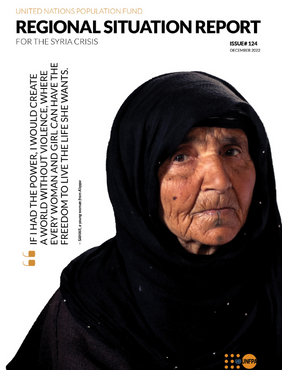
UNFPA Regional Situation Report For the Syria Crisis — December 2022
As the year 2022 comes to an end, Syrians and host communities throughout the region prepare for another difficult year. People in need continue to face the escalating impact of a protracted humanitarian crisis, further complicated by a deteriorating economy, continuing hostilities, and chronic and emerging health threats, including an unrelenting pandemic and a worsening cholera outbreak. The crisis region, which spans the Whole of Syria, Türkiye, Lebanon, Jordan, Iraq, and Egypt, continues to face a multitude of challenges, particularly in light of the recurrent waves of COVID-19 infections that continue to exacerbate existing needs. A decade into this protracted crisis, people in need continue to endure the cumulative effects of years of instability, the risks of which are even higher now due to the ramifications of a far- reaching economic meltdown. The Regional Situation Report for the Syria Crisis offers a bird’s eye view of UNFPA’s operations within the context of the Syria crisis. The report is prepared by the UNFPA Regional Humanitarian Hub for Syria and the Arab States in Amman, Jordan, and spans operations conducted by UNFPA offices in Türkiye, Lebanon, Jordan, Iraq, and Egypt, in addition to operations conducted inside Syria from Damascus and cross-border via Türkiye.
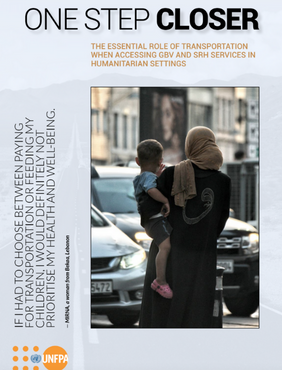
One Step Closer - One Step Closer The essential role of transportation when accessing GBV and SRH services in humanitarian settings
UNFPA’s programme data and assessments show that women and girls consistently identify transportation as one of the first barriers when it comes to accessing health facilities and Women and Girls Safe Spaces in humanitarian settings across Iraq, Jordan, Lebanon, Syria, Yemen, Sudan, and Türkiye. It is well documented that women and girls are often exposed to safety and security risks while commuting, including when trying to access humanitarian assistance such as GBV or SRH services, during which time they may be exposed to sexual or other forms of harassment, physical abuse, or other types of GBV. As one adolescent girl from Ar-Raqqa explains, “we feel less safe than before. When we leave our homes, we are afraid of harassment, rape, and kidnapping.”
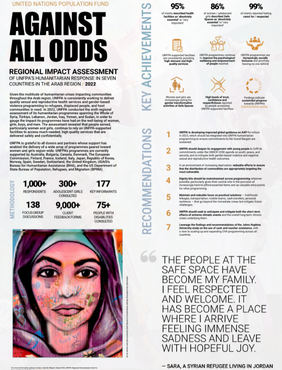
Against All Odds: Impact Assessment of UNFPA’s Humanitarian Response in the Arab Region
Given the multitude of humanitarian crises impacting communities throughout the Arab region, UNFPA is consistently working to deliver quality sexual and reproductive health services and gender-based violence programming to refugees, displaced people, and host communities in need.
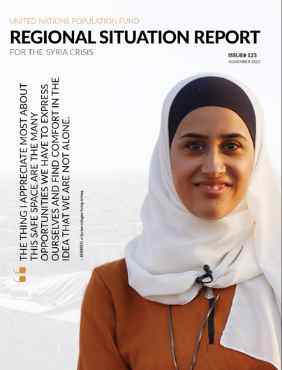
UNFPA Regional Situation Report For the Syria Crisis — November 2022
As the year 2022 nears its end, both Syrians and host communities throughout the region continue to face the escalating impact of a protracted humanitarian crisis, further complicated by mounting region-wide inflation, continuing hostilities, and chronic and emerging health threats, including an unrelenting pandemic and a worsening cholera outbreak. The crisis region, which spans the Whole of Syria, Türkiye, Lebanon, Jordan, Iraq, and Egypt, continues to face a multitude of challenges, particularly in light of far- reaching economic crises that continue to exacerbate existing needs. A decade into this protracted crisis, people in need continue to endure the cumulative effects of years of instability, the risks of which are even higher now due to the impacts of a far-reaching economic meltdown. The Regional Situation Report for the Syria Crisis offers a bird’s eye view of UNFPA’s operations within the context of the Syria crisis. The report is prepared by the UNFPA Regional Humanitarian Hub for Syria and the Arab States in Amman, Jordan, and spans operations conducted by UNFPA offices in Türkiye, Lebanon, Jordan, Iraq, and Egypt, in addition to operations conducted inside Syria from Damascus and cross-border via Türkiye.
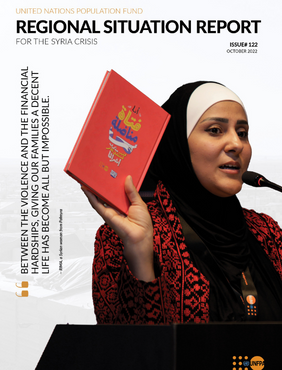
UNFPA Regional Situation Report For the Syria Crisis — October 2022
As of October 2022, Syrians and host communities throughout the region continue to face the escalating impact of a protracted humanitarian crisis, further complicated by a deteriorating economy, continuing hostilities, and chronic and emerging health threats, including an unrelenting pandemic and a worsening cholera out break.
The crisis region, which spans the Whole of Syria, Türkiye, Lebanon, Jordan, Iraq, and Egypt, continues to face a multitude of challenges, particularly in light of the recurrent waves of COVID-19 infections that continue to exacerbate existing needs. A decade into this protracted crisis, people in need continue to endure the cumulative effects of years of instability, the risks of which are even higher now due to the impacts of a far-reaching economic meltdown. The Regional Situation Report for the Syria Crisis offers a bird’s eye view of UNFPA’s operations within the context of the Syria crisis.
The report is prepared by the UNFPA Regional Humanitarian Hub for Syria and the Arab States in Amman, Jordan, and spans operations conducted by UNFPA offices in Türkiye, Lebanon, Jordan, Iraq, and Egypt, in addition to operations conducted inside Syria from Damascus and cross-border via Türkiye. In addition to providing aggregated quantitative results for each country involved in UNFPA’s regional Syria response, this report also brings stories from the field that highlight the plight of communities inside Syria and in host countries, underscoring the positive impact of the response delivered by UNFPA in the areas of sexual and reproductive health, gender-based violence, youth engagement, and others. The report also covers UNFPA’s efforts to ensure continuity of operations throughout the Syria crisis region during the COVID-19 pandemic.
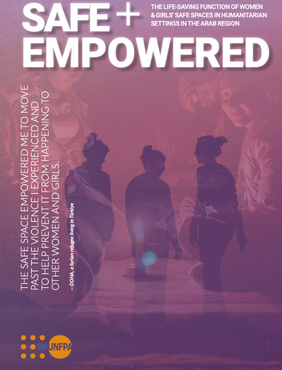
Safe + Empowered: The life-saving function of women & girls’ safe spaces in humanitarian settings in the Arab region
Women and girls’ safe spaces (Safe Spaces) provide a secure, non-stigmatising environment for women and girls and their children to receive comprehensive care services. They constitute an integral, life-saving intervention when programming for gender-based violence (GBV) in emergencies, as outlined in the Inter-Agency Minimum Standards for GBV programming in emergencies.
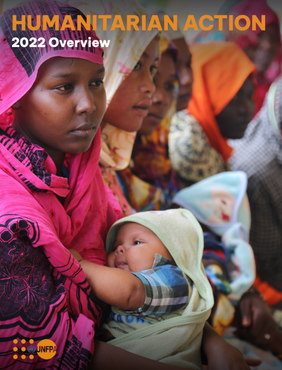
Humanitarian Action Overview 2022
A key strategic shift in the UNFPA Strategic Plan for 2022–2025 is to expand the full spectrum of our humanitarian action to better safeguard the health and lives of women and adolescents. We have mainstreamed resilience, prevention and preparedness and emphasized the complementarity between humanitarian, development and peace-responsive efforts. We are strengthening emergency preparedness, anticipatory action and response systems so that they are more flexible and adaptable. When we anticipate crises, we can work to defuse them before they wreak mass havoc. This is part of our accountability to the people we serve.
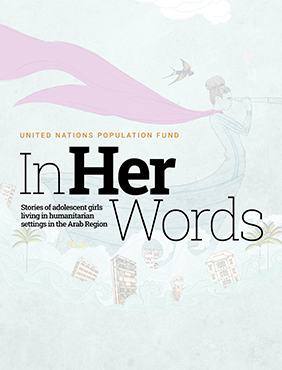
In Her Words - EasyRead Version
In Her Words aims to amplify the voices of adolescent girls in humanitarian settings throughout the Arab region, including Lebanon, Jordan, Iraq, Palestine, and the Whole of Syria. Today, several regions in the Arab states are coping with the lasting impacts of longstanding and emerging humanitarian situations. Both the Syria and Yemen crises have marked their tenth years, while recent developments in Sudan, Ethiopia, and Lebanon have resulted in additional displacements and disruptions in community networks, placing the lives and dignities of millions of people at risk. The lingering effects of the humanitarian situations in Palestine, Iraq, Somalia, and Libya also continue to produce numerous and protracted challenges that require strategic responses. Meanwhile, the worsening impact of the COVID-19 pandemic has only exacerbated the challenges facing communities in those countries, impeding access to lifesaving sexual and reproductive health (SRH) and gender-based violence (GBV) services and resulting in restrictions on movement that have significantly increased the risks of violence against women and girls in communities throughout the region. The pandemic has also intensified the economic fallout of these crises, which in turn have further disrupted social safety nets and increased the likelihood of negative coping mechanisms such as sexual exploitation and child and forced marriages.
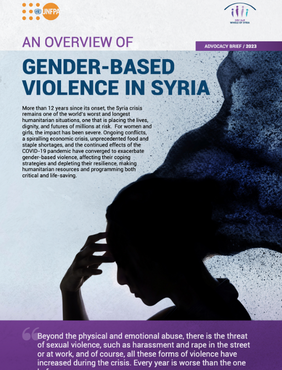
An Overview of Gender-Based Violence in Syria (Advocacy Brief, 2023)
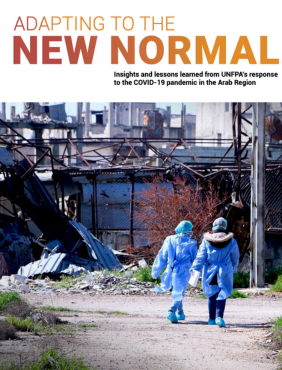
Adapting to the New Normal - Insights and lessons learned from UNFPA’s response to the COVID-19 pandemic in the Arab Region
Two years on, significant progress has been made in the global response to COVID-19. Successful vaccination campaigns and adaptation measures have helped transform a deadly pandemic into a much more manageable health crisis, allowing countries worldwide to begin seeing the light at the end of this dark tunnel. It is at this point in the evolution of the pandemic that humanitarians are encouraged to examine the wealth of knowledge produced throughout this unprecedented crisis — to entrench good practices, learn from missteps, and help communities build greater resilience to future health emergencies.